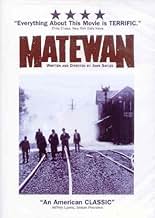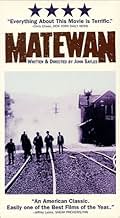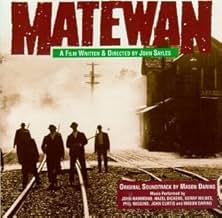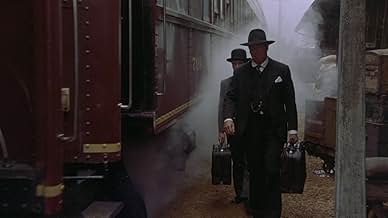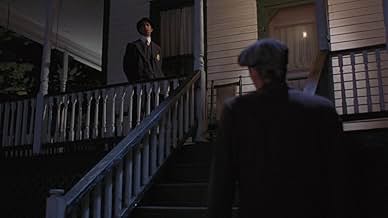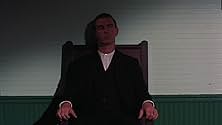A labor union organizer comes to an embattled mining community in 1920 West Virginia, brutally and violently dominated and harassed by the mining company.A labor union organizer comes to an embattled mining community in 1920 West Virginia, brutally and violently dominated and harassed by the mining company.A labor union organizer comes to an embattled mining community in 1920 West Virginia, brutally and violently dominated and harassed by the mining company.
- Nominated for 1 Oscar
- 3 wins & 8 nominations total
- Ellix
- (as Michael Preston)
- Director
- Writer
- All cast & crew
- Production, box office & more at IMDbPro
Featured reviews
See Matewan for its wonderful portrayal of the events that occurred in West Virginia in the 1920's. See this film for its phenomenal cast. See it for its beautiful cinematography. There is an ethereal glow that envelopes the characters and buildings of Matewan.
There is also an underlying allegorical depiction of Christ and his followers. Chris Cooper is a saint. He reminds me of Gary Cooper a little bit. He has such an unusual handsome face. He is the protagonist joined by James Earl Jones, Mary Mcdonnell, and Will Oldman. Perhaps the most fascinating character is that of the Sheriff portrayed by Strathairn. He is the angel on the black horse who carries with him the wrath of God. Just watch him stand up against the bad guys.
The main antagonistic characters are pure evil. They terrorize the inhabitants of Matewan with juvenile antics.
Please see this film and be prepared to have it imbedded in your mind for the rest of your life. This is what great film making is about
Chris Cooper, as Joe Menehan, plays a union organizer intent upon bringing the miners of Matewan out from underneath the heel of the coal mine owners. When intimidation and terror tactics fail to cow the locals, the mine operators and their private security thugs bring in scabs, nominally led by "Few Clothes" Johnson - played by James Earl Jones. When the scabs join the strikers the mine operators resort to all-out warfare against the unionized miners.
David Strathairn, Chris Cooper, James Earl Jones, Mary McDonnell - everyone on the cast delivers a believable, wonderful performance. Everything in this movie makes you feel as if you were really there and depicts this often overlooked event in American history with a stark realism that will leave you thinking about it over and over for a very long time.
Such is the impact of the direction, acting, and writing of this movie that when I saw this movie on video about a week ago, it was still as fresh in my mind as when I saw it last on the big screen on opening day.
10 out of 10. Truly an overlooked classic.
What a lovely world he creates here, among the derelict shacks and cabins of the Pennsylvania foothills of Matewan a moral struggle is fought, flawed characters with faces blackened by coaldust fumble with great ideals and big hopes for a better future, and the one thing that stands between them and justice is their own prejudice. I like how the film suggests that for the collective to be reformed the individual must be reformed first, that we need to look inwards first before we make a stand. The stand in the film is heroic but also desperate, a bit of a lawless old West on the way to emancipation. John Sayles is a leftist and this comes across loud and clear in Matewan, but unlike a Godard film like Week End, Sayles doesn't call for blood, he calls for social justice.
The narrative here sprawls in and out of log cabins where sullen faces plot strikes and discuss ideals, in and out of makeshift tents and muddy town streets where coalminers live and die and sing, now a fiddle or harmonica is calling out from the dark the sad tune of a life of suffering, and the finale is sealed with a shootout filled with tragedy and hope. Sayles' camera doesn't intrude in any of this, rather it's invited in and hankers down out of way to quietly listen or conspire.
Matewan makes a great doublebill with Martin Ritt's The Molly Maguires, another forlorn drama of the oppressed that speaks of moral devastation in the Pennsylvania coal fields, but more, it stands by itself as one of the great American narratives of the 80's.
The conditions these workers faced were brutal. Miners had to pay for all their own equipment, their housing was owned by the mining company and they also paid for it, workers were also paid in credits which they could only use at the mining company store. Workers who went strike were subsequently evicted from their homes.
This movie is great. It's a page from history which should be told much more often. James Earl Jones is terrific as a black miner who is signed up as a scab but he's actually a union sympathizer who encourages the black scabs to strike with the West Virginia workers.
Chris Cooper is also great as a union organizer. I think he's a highly underrated actor. He was very good in American Beauty as the hick next door neighbor and he's great in Matewan as well. Proof, I believe that he can really take on any role.
Bob Gunton is also a great actor. This movie was made long before he was playing every two bit villain of the week. I think that was due to his role as the warden in The Shawshank Redemption where he just let it all out.
I liked one scene in particular early in the film where the union men on strike try to weed out Cooper by finding out how much he knows about union history. Where was Joe Hill buried? In which eye was Big Bill Haywood blind in? Cooper also quips, "I was a Wobbly, back when that meant something" But he does support the notion of One Big Union. The IWW will rise again!
Anyway, the film is very honest, subtle and exquisite. You don't feel, as you do with many films churned out by Hollywood, that things have been altered and embellished for the sake of making it interesting--it's very natural, and it seems very real. You're confidant that Sayles is giving you the truth here, as best he can, through his visual style, restrained, natural dialogue and engaging historic atmosphere.
It's movies like this that renew my faith in period pieces. Important historical films at their best are able to capture a period and bring the audience as close as possible to experiencing the 'feel' of that time--I guess that kinda goes without saying though.
Did you know
- TriviaThe miners' union was broken by 1921, after President Warren G. Harding put the entire state of West Virginia under martial law and sent the army to the coalfields to defend the companies against their employees. By then, hundreds of miners had been killed, thousands arrested and jailed. It was not until 1935, under Franklin D. Roosevelt's New Deal, that union organizing was legally protected in the United States.
- GoofsLook for the sheriff to remove a gun from someone's hand (by holding the gun by the barrel) after it's been fired four or five times.
- Quotes
Joe Kenehan: You think this man is the enemy? Huh? This is a worker! Any union keeps this man out ain't a union, it's a goddam club! They got you fightin' white against colored, native against foreign, hollow against hollow, when you know there ain't but two sides in this world - them that work and them that don't. You work, they don't. That's all you get to know about the enemy.
- How long is Matewan?Powered by Alexa
Details
Box office
- Budget
- $4,000,000 (estimated)
- Gross US & Canada
- $1,680,358
- Opening weekend US & Canada
- $23,850
- Aug 30, 1987
- Gross worldwide
- $1,680,358


